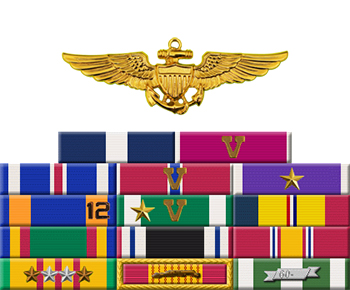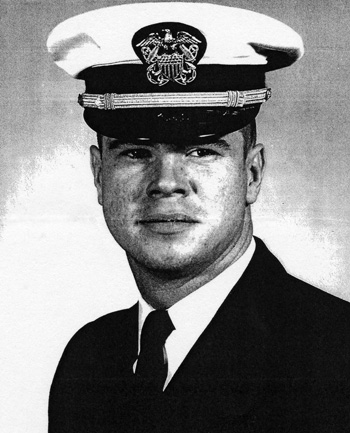JJ Connell was born on May 6, 1939, in Wilmington, Delaware. He graduated from the U.S. Naval Academy on June 7, 1961, and was designated a Naval Aviator on June 18, 1962. After completing additional training, Connell was assigned as a flight instructor at NAAS Whiting Field, Florida, from December 1962 to November 1963, when he joined the Replacement Air Group at NAS Lemoore, California. He next served with Attack Squadron 55 aboard the aircraft carrier USS Ticonderoga (CVA-14), at NAS Lemoore, and aboard the USS Ranger (CVA-61), from August 1964 until he was forced to eject over North Vietnam on July 15, 1966. After spending 1,645 days in captivity, LCDR Connell died at the hands of the North Vietnamese on January 14, 1971. His remains were returned to the United States on March 6, 1974, and he was buried at Fort Rosecrans National Cemetery in San Diego, California.
His Navy Cross Citation reads:
The President of the United States takes pride in presenting the Navy Cross (Posthumously) to James Joseph Connell, Lieutenant Commander [then Lieutenant], U.S. Navy, for extraordinary heroism as a Prisoner of War in North Vietnam from April 1968 to June 1969. Under constant pressure from the North Vietnamese in their attempt to gain military information and propaganda material, Lieutenant Commander Connell experienced severe torture with ropes and was kept in almost continuous solitary confinement. As they persisted in their hostile treatment of him, he continued to resist by feigning facial muscle spasms, incoherency of speech, and crippled arms with loss of feeling in his fingers. The Vietnamese, convinced of his plight, applied shock treatments in an attempt to improve his condition. However, he chose not to indicate improvement for fear of further cruelty. Isolated in a corner of the camp near a work area visited daily by other prisoners, he established and maintained covert communications with changing groups of POW's, thereby serving as a main point of exchange of intelligence information. By his exceptional courage, determination, and resourcefulness in this most difficult line of resistance, he reflected great credit upon himself and upheld the highest traditions of the United States Naval Service and the United States Armed Forces.
|



